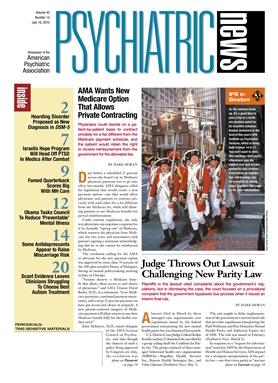How will medicine work with the pharmaceutical and medical-device industries to support continuing medical education?
It's the question that won't go away and one that the AMA continues to wrestle with. But for the fourth time in two years, a report by the AMA's Council on Ethical and Judicial Affairs (CEJA) titled “Financial Relationships With Industry in Continuing Medical Education” was rejected by the House of Delegates.
This time around, CEJA's report garnered praise from a number of quarters for its careful weighing of the benefits and risks associated with industry financial support of continuing medical education (CME), and the reference committee—where hearings are held on all items of AMA business before coming to the full House of Delegates—recommended that the report be accepted.
But the House of Delegates sent the report back to CEJA yet again, with many physicians saying that language throughout the report exceeded the jurisdiction of the AMA in governing the behavior of individual physicians and encroached on the territory of organizations and specialty societies, many of which—like APA—interact with industry to provide CME to their members.
Most of those arguing against the report pointed out that the organizational interaction with industry was governed by strict rules for accreditation from the Accreditation Council for Continuing Medical Education and the Council of Medical Specialty Societies.
“The report goes well beyond the purview of the council, and we strongly believe that organizational issues should be dealt with by the organizations themselves,” said William Golden, M.D., chair of the delegation from the American College of Physicians. “It is very problematic for the AMA's Council on Ethical and Judicial Affairs to make pronouncements about the behavior of other organizations.”
Ted Epperly, M.D., chair of the delegation from the American Academy of Family Physicians, said that CEJA had “confused the relationship between individual physicians and organizations” and had “stepped into the space of professional organizations.”
And past APA President Carolyn Robinowitz, M.D., chair of the Section Council on Psychiatry, concurred. “We feel that this report attempts to define what organizations should be doing and goes far beyond the scope of the AMA, which deals with individual physicians.”
(Robinowitz is also a member of the APA Board of Trustees and interim editor in chief of Psychiatric News.)
‘Perfection Is Out of the Question’
CEJA's struggle to master the issue of industry funding for CME reflects the enormous sea change that all of medicine has undergone with increasing public and regulatory oversight of relationships that had for years drawn little attention.
In April, APA's Board of Trustees adopted a new code of conduct aimed at creating greater transparency for APA's organizational relationships with industry (Psychiatric News, June 18). The code formalizes some practices that were already in place and establishes a new Board-level Conflict of Interest Committee to oversee APA's relationships with industry.
“The entire field of medicine is moving toward greater transparency in its relationships to industry, and APA has been at the forefront of that trend,” APA Medical Director James H. Scully Jr., M.D., said in a statement. “While we think there is a place for industry support of our organization's goals, we believe any relationship should be transparent and that marketing should be clearly separate from medical education.”
But the issue of how organized medicine will move forward in a new era in which industry funding will be scrutinized much more closely remains a contentious one, as was evident at times in the debate at AMA's House of Delegates.
One representative from the Association of Clinical Researchers and Educators said that the CEJA report was a “bad report” that differed little from previous iterations and that there was little or no clear evidence that industry support of CME contributed to educational bias or to bias in physician behavior.
But it was also clear that the CEJA report went a long way toward satisfying the concerns of many physicians in the House of Delegates and toward balancing the nuances of what John McIntyre, M.D., APA senior delegate and member of the Section Council on Psychiatry, called “an enormously complex issue.”
Issue Likely to Return
McIntyre predicted that CEJA would come back again, possibly at next year's meeting in June, with another report and that it stood very good chance of being adopted.
And there were some at this year's meeting who argued that the AMA could not afford to wait for a report that pleases everyone.
In presenting the CEJA report to the House of Delegates, council member and neurosurgeon Patrick McCormick, M.D., of Toledo, Ohio, said the report “grants that knowledge is gained and shared in collaboration with many shareholders, but that we in medicine must manage these collaborations to ensure that we are in control of medical education.
“This is essential for public trust,” he observed.
Laura Meyers, M.D., an orthopedic surgeon from St. Louis, speaking for the Section Council on Orthopedic Surgery, said, “Realistically, perfection is out of the question. The complexity of this issue precludes it. This is a good report.”
